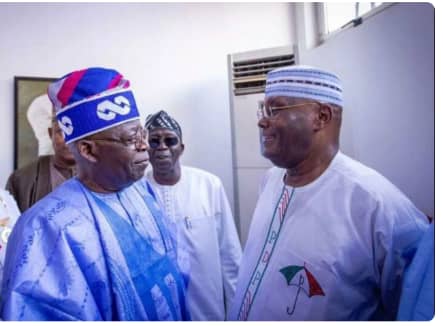
2027: Regional Maneuvering, National Unity and the Dilemma of One-term Agitators
By Kabir Akintayo
The political landscape in Nigeria has long been shaped by regional dynamics, particularly between the North and the South.
Since 1999, following the transition from military to civilian government, there was a consensus that power should return to the South, specifically the Western part, to compensate for the annulment of the June 12 election which was indisputably won by Late Mashood Kashimawo Olawale (MKO) Abiola.
During the 1999 general elections, General Olusegun Obasanjo (rtd) was elected President on the platform of the Peoples Democratic Party (PDP). He became the second democratically elected President of Nigeria, following Alhaji Shehu Shagari in 1979. After completing his eight-year tenure, Obasanjo handed over power to Umaru Musa Yar’Adua, a Northerner, who unfortunately passed away three years into his term.
Yar’Adua died on May 5, 2010. The Vice President, Goodluck Ebele Jonathan, a Southerner, was sworn-in to complete Yar’Adua’s term. Against the run of play and contrary the party’s constitutional provision for rotation which should have retained power in the North till 2015, Jonathan contested the 2011 general elections, defeating General Muhammadu Buhari (rtd) of the Congress for Progressive Change (CPC) to become the fourth elected President of Nigeria.
Based on the fact that Jonathan was not supposed to run in 2011, there was an agreement between him and some kingmakers led by Chief Obasanjo that he would serve only one term, allowing power to rotate back to the North to compensate for Yar’Adua’s incomplete tenure.
Buoyed by the vociferous support of ethnic champions like Pa Edwin Clark and Asari Dokubo, Jonathan chose to swim against the tide again but this time he underrated the depth, wave and determination of the water to sweep him away. Before he could realise it, his Presidency had been swept away by a raging flood.
The handshake between the North and Southwest which was initiated by renowned kingmaker, Asiwaju Bola Ahmed Tinubu, brought President Muhammadu Buhari to power in 2015 after he had failed on three previous occasions. The handshake also involved a gentleman agreement among the stakeholders that the kingmaker would himself be crowned king in 2023.
In the run up to the 2023 general elections, a lot of the beneficiaries of the kingmaker’s generosity around President Buhari however tried to scuttle his coronation. They put all manners of obstacles in his way but like the big game player that he is, he weathered the storm with philosophical calmness. Reason eventually prevailed and he was elected President of the Federal Republic of Nigeria.
2027 Permutations
President Tinubu had barely spent a few months in office before impatient and ambitious politicians, and their minions from the other side of the handshake began to criticise him harshly and issue childish and infantile threats about 2027. Suddenly, they all forget that it was President Buhari who took the initial legal and administrative steps to activate the fuel subsidy removal policy which President Tinubu met as a fait accompli. They all have forgotten that the new found hero they are gravitating towards, Atiku Abubakar, who is a perennial Presidential election pretender, also anchored his 2023 campaign around fuel subsidy removal and floating of the Naira – two of the controversial policies which President Tinubu is being blamed for because of the temporary challenges they have brought. They have now forgotten the hunger, pain, torture, killings and kidnappings they suffered in Niger, Kaduna, Katsina, Sokoto, Zamfara, Kebbi, Borno, Yobe states etc between 2015 and 2023. But now, they are threatening fire and brimstone about 2027 with the wild claim that they are suffering under President Tinubu. They forget that the extreme ones among them declared any form of protest against constituted authority Haram in Islam and during EndSars and RevolutionNow protests, some of them violently stopped people from other parts of the country from protesting against President Buhari. But now, they want to protest under Tinubu. Suddenly, the same people who argued that President Buhari could appoint anyone he was comfortable working with and ignore other tribes that he didn’t like are now complaining of lopsided appointments under President Tinubu.
Read Also:
Their angst which they claim is based on incompetence, bad governance, and high living costs has sparked intense debate on social media as some Tinubu supporters have argued that they had remained loyal and supportive during Buhari’s eight years despite his administration’s shortcomings. They therefore accuse their compatriots from the other side of hypocrisy and double standards for hastily seeking change without considering Nigeria’s recent political history and gentleman agreements.
Coordinated Attacks on the Establishment
At the slightest provocation, some entrenched interests like leaders, politicians and activists seize the media to talk badly of the administration. Both in the social media and conventional press, even people like Ali Ndume who are supposed to be part of the government turn themselves to emergency activists and are seen almost on a daily basis attacking the President and saying people are suffering under his watch like never before. He took his series of populist statements to a ridiculous level recently when he said the N70,000 minimum wage approved by the President is too small, that it can only buy one bag of rice.
There has to be a limit to lousy criticism and cheap populism. If not for mischief and intention to incite the masses against the government, what is the business of the lowest earner in service with bag of rice?
Talking about incitement, the manner of reportage of the recent Samoa agreement by the leading newspaper in the North is nothing but unprofessional. The Newspaper deliberately sought to incite the conservative and sensitive Northern population against the government by tainting the agreement with same-sex union even though their editors didn’t see a copy of the agreement before going to Press. The front page story insinuated that the government signed an agreement to pass the law that will permit Lesbian, Gay, Bisexual, Transgender and Queer (LGBTQ) relationships in Nigeria which is complete falsehood.
The spontaneous reaction from the northern streets and on social media was that the people would in 2027 reject any administration that tries to impose LGBTQ rules on the nation. The Northern Elders Forum (NEF) and several other groups also declared that the North would work against President Tinubu in 2027. This goes to show that there is a coordinated effort to demarket the administration.
Atiku, Nasir El-Rufai (whose uncouth children have been verbally attacking the President on social media), Rabiu Kwankwaso and other ambitious folks have been holding meetings and moving round the country in suspected move to give President Tinubu the Jonathan treatment in 2027.
The options before these Northern agitators are however narrow. If they present anyone from among themselves to challenge President Tinubu in 2027, they will be putting the unity, stability and continued existence of the country to an unprecedented test. This is because according to the unwritten rule which has sustained the federation till today, power is supposed to remain in the South till 2031. The only option is to field another Southerner to challenge Tinubu in 2027 since second term is not automatic and it is not the birthright of any individual. There is a precedent for this. Even when everyone agreed that President Buhari had a disastrous first term in office, the bi-partisan consensus across the country was that power should remain in the North in 2019 even if Buhari will be voted out. That was why only Northerners were allowed to contest the 2018 PDP primary election held in Port harcourt.
If that fresh candidate wins the election however, he will definitely seek reelection in 2031 (Even if he promises not to do so. Such promises are meant to be broken!) and bulldoze his way to victory, thereby, making the North wait for another four years. Therefore, more pragmatic leaders in the North may prefer to wait for President Tinubu to complete his eight-year tenure rather than risk another Southern candidate that will perhaps extend beyond a four-year term.
Last line
While President Tinubu must do better between now and the next three years to justify the historic mandate Nigerians gave him last year, Nigerian politicians must always strive to put the country over selfish, parochial, regional and ethnic interests. It is obvious that these rabble rousers threatening fire and brimstone in the media are not motivated by patriotism but by inordinate ambition.
















